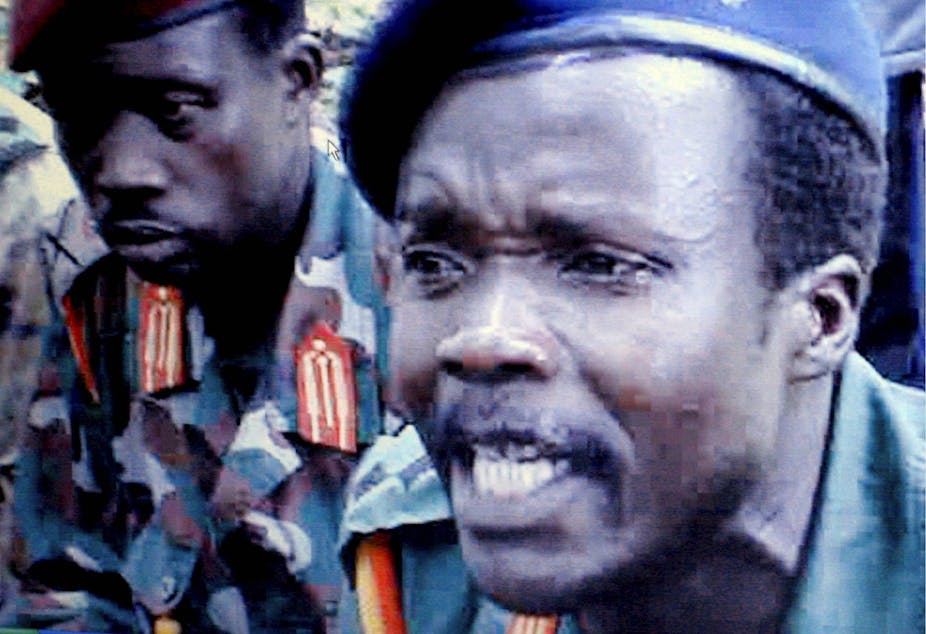Earlier this week, the new US Secretary of State, John Kerry, announced a US$5 million reward for information leading to the arrest, transfer and conviction of notorious African warlord Joseph Kony.
On the same day, the African Union (AU) announced that they have suspended their hunt for Kony, citing a lack of co-operation from the new government in Central African Republic (CAR).
Both of these announcements come just over a year after Invisible Children’s short film, Kony 2012, went viral on the internet, bringing worldwide attention to the actions and litany of war crimes committed by the Kony-led Lord’s Resistance Army (LRA).
While the film unarguably raised the profile of Kony and the LRA, he, along with other ICC-indicted members of the LRA, remains at large. Considering all of this, it is pertinent to ask what the effects of the Kony 2012 campaign might have been, and how the recent announcements from Kerry and the AU will affect attempts to bring Kony to justice.
Under the guise of various organisations and armed groups, Kony has waged war in central Africa for over twenty years. However, it is as leader of the LRA that he has gained most notoriety. Originally fighting against government troops in Uganda, the LRA has also operated in South Sudan, Democratic Republic of Congo (DRC) and Central African Republic (CAR).
The violence perpetrated by the LRA is symptomatic of much of the violence that we have witnessed in this region in the last twenty years: small, well-armed militias fighting against troops from weak governments, their movement facilitated by porous borders. Their methods include - but are not limited to - the forced recruitment of child soldiers, deliberate targeting of civilian populations and rape and sexual enslavement as weapons of war.

Kony 2012 highlighted the atrocities committed by Kony and the LRA. The film was part of a broader campaign to have Kony arrested and transferred to the International Criminal Court (ICC) in The Hague, where he has been indicted on 12 counts of crimes against humanity (including sexual enslavement and rape) and 21 counts of war crimes (including intentionally directing an attack against a civilian population and forced enlistment of children). The short film was viewed by over 100 million people and ranked as one of the most important international events of 2012 by the American Public Broadcasting Service.
Three weeks after the video went viral, the African Union announced that it was forming a 5000-strong military brigade to capture Kony, now thought to be hiding in CAR. Made up of troops from Uganda, CAR, DRC and South Sudan, the AU force was also complemented by approximately 100 US military advisors.
But ongoing political turmoil in CAR has forced the AU to suspend its hunt for Kony. A coup in late March overthrew the former President François Bozizé, a strong supporter of the AU’s military efforts to defeat the LRA and CAR’s membership of the AU remains suspended.
As Kasper Agger from Enough Project argued, it would be “a catastrophe for civilians in the Central African Republic” if AU troops left the country. With a lack of central government and ambiguity over the status of the military, CAR is essentially a failed state.
While the LRA is not as strong as it once was (Ugandan officials estimate its numbers at about 250 men, mostly scattered in small groups), it continues to abduct children and raid villages in CAR. However, the political situation in CAR provides a fertile environment for the possible reinvigoration and growth of the LRA and a safe haven for Kony.

The State Department’s announcement, however, might offer an alternative avenue to justice. Where the Bush administration was a vocal critic of the ICC, the Obama administration has demonstrated a greater willingness to cooperate with and support the Court. In making it clear that the reward was not a bounty and that information “must lead to the secure arrest, transfer or conviction … in a court of law”, the US has offered, admittedly tacitly, further support to institutions of international criminal law as possible mechanisms of peace and security.
For a variety of extraneous reasons, the Kony 2012 campaign ran out of puff very quickly. While the group should be commended for raising the profile of this particular issue, little else resulted from the video campaign. Indeed, arguably the greatest flaw of the campaign was its failure to appreciate the political complexities that contribute to the ongoing violence in central Africa. As pointed out above, the political chaos in CAR has proven to be an intractable hurdle to collaborative efforts to bring Kony and his ilk to justice.
Echoing the raison d’être of the ICC, Kerry argued that:
Impunity is the enemy of peace. Accountability is essential to preventing atrocities from taking place in the future.
These are laudable sentiments. If one considers the recent surrender of Bosco Ntaganda to the ICC, it appears that supranational legal mechanisms, albeit with monetary incentives from the United States, might provide an avenue to peace and stability for a region that has seen very little of either in the past twenty years.

